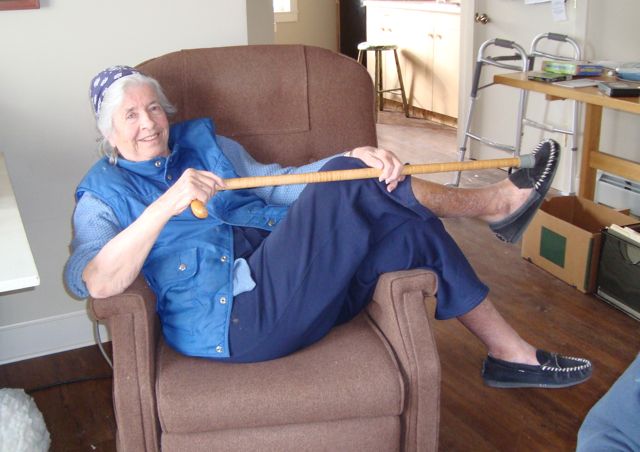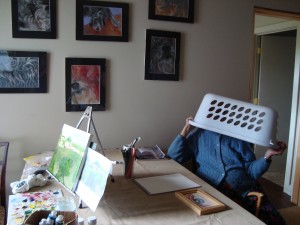by Beth Whitman
The mom I knew all my life always took a back seat to my charming and gregarious father, Arthur. Whether out in the world or at home with the family, Mom was, in my eyes, the second parent.
She gave me a lot of wisdom over the years, and for that I am truly grateful. She taught me to take charge of my own learning within a school setting. She taught me how to manage and overcome my shyness and my genetic propensity to blush at the drop of a hat. And she brought to our whole family a rich knowledge regarding her passions: music, archaeology, nutrition and holistic healing.
But it was Dad who always spoke for the family. It was Dad who undertook the difficult conversations with us kids. And most of the time, when Dad was around, it was he who acted as intermediary between Mom and the rest of the world. Mom loved to be around people, but she had a natural reticence that kept her interactions to a minimum. The people who became friends of the Whitman family did so primarily through Dad. When he spoke, people naturally listened. He wasn’t loud, but he was forthright. He was friendly, funny, inclusive, and had an uncommon command of history and facts. We often described Dad as being able to converse as easily with beggars as with kings — he could charm his way out of most any difficult or even dangerous situation. Dad was not only the center of the family’s attention, but often the community’s attention as well.
So, in a way, Mom had a tough act to follow. It’s no easy task to be married to a person with such presence and standing. Indeed, over the span of their life together, I generally perceived Dad as growing ever larger, and Mom shrinking by comparison.
As Mom’s memory began to fail, this disparity became even more pronounced. Dad would finish the stories Mom started. Dad would inject the names that Mom couldn’t come up with. Dad would keep in touch with family friends, and Dad would entertain the guests in our home. Dad talked, Mom nodded. Dad went out, Mom went with him. Dad lead the way, and Mom followed. More and more, Mom faded into the background.
That is, until Mom reached the middle stages of Alzheimer’s, which coincided, more or less, with my father’s stroke.
So two things happened, one shortly after the other, and the entire dynamic underwent a change. Suddenly Dad was less able to speak, less able to get around independently, and less able to think clearly. And a short time later, Mom started becoming less focused on Dad, and actually started taking center stage.
She was still dependent on Dad in many ways. Dad was always her rock, and could always calm her down from the Alzheimer’s-related anxiety attacks that were creeping up on her with more regularity. He could, in a way that no one else was able, coax her to do things that she normally, and stubbornly, refused to do for anyone else.
But Mom really started stepping out once she and Dad moved in with me. Mom actually became flamboyant, and started taking more of the spotlight than Dad. She demanded to be the focus of people’s attention. And people responded. Folks coming over to visit would address Mom now instead of Dad. When there was any sort of activity going on in the house, Mom would come over and readily join in.
For instance, when I was in the kitchen preparing food, Mom would always want to help. At first I could count on her to peel cucumbers for a salad, and then slice them up. But after a while she stopped being able to distinguish which part was to eat and which part was not, so she would simply peel the whole cucumber down to a nub. As time went on, I would set her to simpler and simpler tasks. After a while she stopped being able to hold a knife, so I would give her a loaf of bread to break into pieces. Anything to make her feel like she was part of the activity in the kitchen.
And then she would want to do the dishes. She would insist on doing the dishes. But she would do the same dish over and over again, and so I would have to drop what I was doing and do the dishes with her — or she would stand there forever washing and rinsing, washing and rinsing, washing and rinsing that one dish.
And during our in-home art class, when there were a number of people in the house, each quietly working away on their own project, Mom would come in and sit with us, wanting us to look at her and talk to her. Sometimes I would have to stop what I was doing to focus my attention on her so she wouldn’t get upset. And one time, because we weren’t paying enough attention to her, she picked up a laundry basket that was sitting nearby and put it on her head, upside down so that her face was imprisoned within. We spent the rest of the art class occasionally peering in at her through the holes in the plastic basket. And every time someone looked in, she would be there, looking out at us, grinning.
She also became more physically demonstrative, and would often insist that I sit in her lap. And then, whenever I did, she would hold onto me and not let me get back up. It was a game we played. And we had a lot of fun with it, for the most part.
I often wondered about this part of my mother that I had never seen before. In some ways I thought that maybe I was seeing a more authentic version of her, a glimpse of her not mediated by societal and family expectations.
I don’t know. But I do know that I wouldn’t have missed, for all the world, having this time with Mom where I got to see a side of her that was so much more free, funny, joyful, and more overtly loving than the woman I had known her to be in all my previous experience. To see her in this light was a gift I never expected.
Beth Whitman lives in Maine and is a member of Belfast Cohousing and Ecovillage, a developing community on the coast of Maine focused on multigenerational living and sustainability.








My mom was the opposite of your mom, she was strong willed, outspoken, ruled her family with tenacity and a will of iron. Basically, she raised five sons and two daughters single handed. She was obsessed with us matching and coordinating outfits, cleaningless was definitely next to godlinessness and she never spared the rod. A perfectionist that expected the best, with one example being her snatching all coverings off a bed if one wringle appeared from the bottom sheet. You remade the bed and endured a lesson on being lazy and slothful. She didn’t get much former education but had great respect for education and encouraged her daughters to do well and never depend on a man. She made every effort to insure my sister and I had the skills and education to be able to take care of self and if we had children them too, and not be at the mercy of any man. That power and command for respect served her well in the health care facility. She commanded and received respect and then love.
I never thought I’d live to tell the story because I got called so frequently where she hit a nurse or a patient or a patient hit her, only to arrive and she had no memory of the event. Church was the most important part of her life throughout her life. And the hymns and prayers she learned in the Black Baptist Church substained her and others were moved to tears hearing her sing those songs and praying those prayers. I tried a journal but got too caught up in care giving and feeling abandoned by my siblings and even my daughter. I felt nobody cared, but, later learned that each person dealt with the disease and memory lost in their own way. That was a horrible journey, and I wouldn’t wish it on my worst enemy. Alzheimer’s is one hell of a disease and my heart goes out to the patient and expecially any and all care givers.
I could have written this about my mother … my father is still his same old self and takes the limelight, but he is nearly bedfast now and it limits his presence in many ways. Thank you for opening my eyes about some of my mother’s new behaviors.
Loved reading this and thinking about my own mom and her funny way when she had Alzheimer’s . Thanks for sharing. You made me smile
Alzheimer’s is a cruel disease in so many ways. Apparently in the various stages similar things happen to people. It’s like you were writing abut my Mom. Thanks for sharing, and caring. My Mom lives with us, as hard as it is, I couldn’t be anywheres else.
Thank you for sharing a piece of your heart with us. She sounds like a HOOT!
Thank you. I have truly enjoyed all that you have shared about your Mom and Dad. I laughed out loud with the laundry basket on her head. To know she went from being no nonsense to silly and make-you-laugh kind of person has had to have been a lot to get used to. But then again the disease is a lot to get used to! I find that my Mom and I do still laugh together and I cherish those times. I find myself thinking about the funny things she says or does when she is having a day that is challenging for both of us.
What a wonderful daughter you are!
My Dad who has always been a loving and devoted father of ten and husband has been showing signs of dementia and recently had a stroke,but by the grace of God does not have deficits other than weakness and his memory is worse.
My Mom has trigeminal neuralgia and has a lot of pain.Mom is such a good support for my dad,but i worry she could have a stroke herself.We love our parents dearly and want to help,but how should we help in a respectful way ?